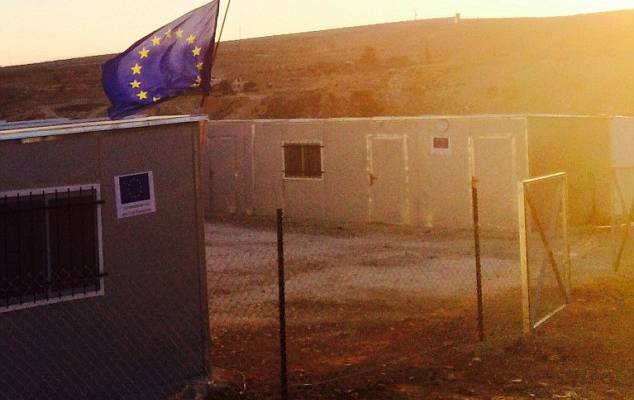Regavim, an NGO that monitors unlawful Arab building in Israel, discovered an illegal road built by the Palestinian Authority and funded by the European Union.
By: United with Israel Staff
The European Union (EU) has funded an illegal road built by the Palestinian Authority (PA) on territory under Israeli administration, Regavim, a research-based legal advocacy NGO dedicated to ensuring accountable use of Israel’s national land, charged.
“Regavim caught the PA red handed building a terror road in Area C near Tekoa (a Jewish community in Judea). The funding for the illegal road was proudly provided by the EU,” the NGO stated on its Facebook page.
Under the 1993 Oslo Accords – signed not only by Israel and the PA, but also by the EU, among other parties – while the PA maintains full or partial control over Areas A and B in Judea-Samaria, in Area C, Israel maintains exclusive military and civilian authority, including in issues of planning and construction.
This is not the first time Regavim has accused the EU of funding illegal Palestinian construction, with documented evidence.
According to an article in February 2015 in the UK’s Daily Mail, for instance, “More than 400 EU-funded Palestinian homes have been erected in Area C of the West Bank (Judea and Samaria), which was placed under Israeli jurisdiction during the Oslo Accords – a part of international law to which the EU is a signatory. The Palestinian buildings, which have no permits, come at a cost of tens of millions of Euros in public money, a proportion of which comes from the British taxpayer. This has raised concerns that the EU is using valuable resources to take sides in a foreign territorial dispute.”
Two weeks ago, Regavim filed a court case against the new illegal construction. The road, which allegedly includes about 10 kilometers already paved, extends beyond Palestinian Authority (PA)-administered territory into Gush Etzion and towards the Dead Sea.
Member of Knesset Bezalel Smotrich turned to Defense Minister Moshe Ya’alon, warning of the symbolic and practical meaning of the road’s construction, Ynet reported.
The issue is expected to be raised for discussion at the Knesset’s Subcommittee for Foreign Affairs and Defense, Ynet said, where a number of lawmakers will seek explanation as to why work on the road hasn’t been stopped and demand that the state begin demolition work on the already-existing infrastructure.
‘Strategic Impediment of the Highest Order’
“This road is a snake in the grass,” Oved Arad, head of the land division of Regavim, said, according to Arutz-7. “We are talking about a strategic impediment of the highest order. According to the Oslo accords, this is the only spot where Israel can construct this important road that can connect from Gush Etzion to the Dead Sea and from there to the Jordan Valley and the Arava.
“If the Palestinians build the road with EU funding, it will allow them to gain control of large amounts of Israeli land in the Judean Desert and to annex it to their control. Israel cannot give up on the land, and certainly not to allow foreign countries to come in and take it over.”
Not only would construction of the road appropriate land from Area C, which is legally under Israeli authority, but it would also increase the exposure of Israelis to Palestinian terrorists who throw rocks.
